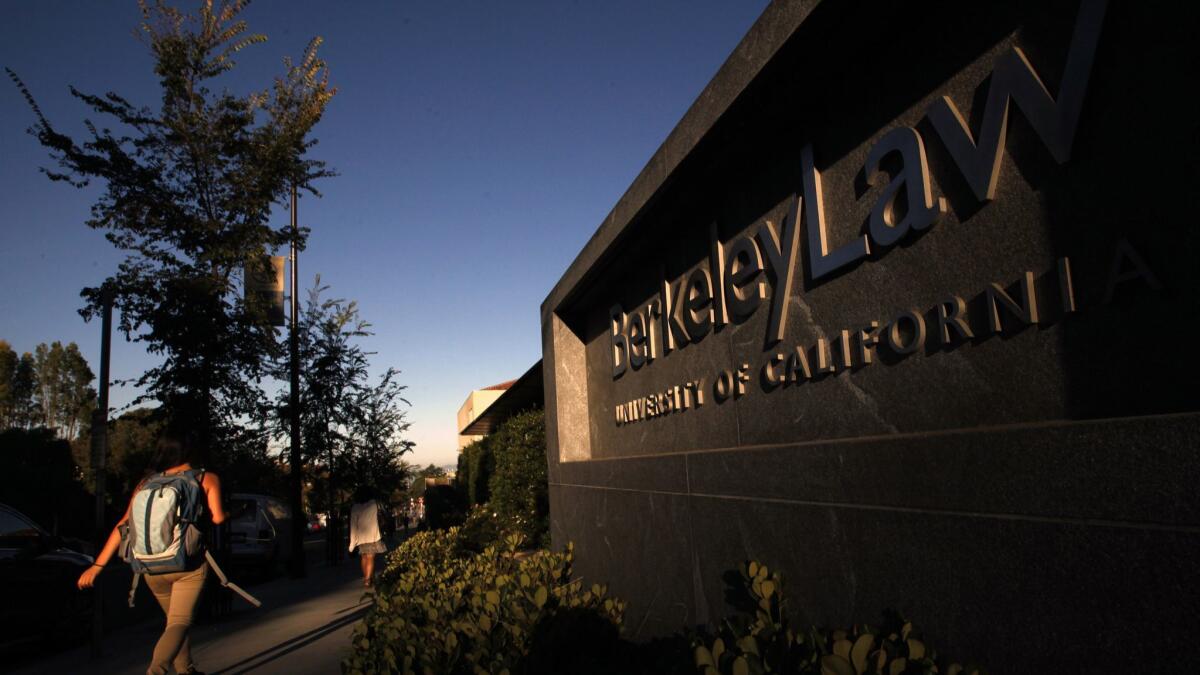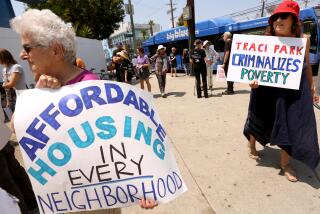Business improvement districts are ‘anti-homeless,’ new UC Berkeley report says

In a scathing review of the state’s proliferating business improvement districts, a student project released Tuesday by the UC Berkeley law school accuses the nonprofit groups of systematically abusing homeless people.
The report by the Policy Advocacy Clinic at UC Berkeley School of Law alleges that business improvement districts, or BIDs, are exacerbating the plight of the homeless “by excluding homeless people from public places without addressing the causes and conditions of homelessness.”
The research paper, released online and at events in Los Angeles and other cities Tuesday, links the rise of the districts, which now number about 200 in California, to an increase in the number of anti-homeless laws.
“BIDs seek to enact, maintain, and strengthen laws that criminalize activity like sitting, resting, sleeping, panhandling, and food sharing in public spaces,” the report said.
“To enforce such laws, BIDs collaborate closely with local police departments and hire or contract with private security.”
The report was prepared for the Western Regional Advocacy Project, a San Francisco homeless advocacy group, which released it with a caustic statement.
“BIDs are a concerted and growing effort to erase from cities any sign of vast inequality while at the same time perpetuating it,” the group’s executive director, Paul Boden, said in a statement. “BIDs work to manufacture the appearance of prosperity in the city square but that farce comes at the expense of basic human rights for the unhoused poor.”
The authors recommend that the state Legislature rewrite laws to prohibit using property assessment fees for policy advocacy and policing.
Officers of districts contacted by The Times faulted the report as vague and oversimplified.
“To make this connection between BIDs and so-called anti-homeless laws and the increase in homelessness is a pretty simplistic view of what is a really complex social problem right now,” said Kerry Morrison, executive director of the Hollywood Property Owners Alliance, a nonprofit that oversees two Hollywood-area business improvement districts.
Morrison, who also serves on the citizen oversight committee for the city’s Proposition HHH homeless housing bond, appeared at City Hall recently to urge approval of a site in Hollywood for a homeless shelter.
“Is that public advocacy?” Morrison asked. “Should we stay silent on being in support of a homeless shelter in a Hollywood neighborhood? You can’t have it both ways. Are they asking that our voice be silenced in a public forum?”
Business improvement districts are formed under state laws that allow property owners to assess fees on themselves to supplement public services. State and federal laws authorizing business improvement districts date to the 1960s in response to the decline of downtown districts.
Initially operating under city oversight, the districts gained more independence with new laws in the 1990s allowing a majority vote of property owners — weighted by assessment — to petition the city to form a district and authorizing districts to spend money on direct services such as sanitation and policing.
The report documented an increase in business improvement district formations after those laws were passed.
“During the 20 years from 1975 to 1994, 13 BIDs were established and 61 anti-homeless laws were enacted,” it said. “During the 20 years from 1995 to 2014, 60 BIDs were established and 193 anti-homeless laws were enacted.”
In Los Angeles, a consortium of business improvement districts has 38 member organizations.
The districts have long been criticized for targeting homeless people for removal.
But the new study argues that they are breaking state law by using mandatory property assessments — some from public entities — to advocate for legislation.
Based on public records requests and about 100 responses from 189 California business improvement districts it attempted to survey, the researchers concluded that on average nearly 17% of their assessment revenue came from publicly owned properties.
The paper also alleges that some districts stray from the legal requirement that assessments fund only activities that result in “special benefits” to the members.
“Los Angeles’ Downtown Industrial BID does not mention policy advocacy in its planning documents, yet in its quarterly reports to the city, it classifies activities like testifying at city council meetings and meeting with council staffers as assessment-funded,” the report said.
Estella Lopez, executive director of the district, responded that its members expect her to advocate with the city.
“My day is consumed with the working men and women of the industrial district who ask me questions and provide me with information they expect me to communicate to the city of Los Angeles,” Lopez said.
The report recommends changes in the law to prohibit spending assessment money on security and to clear up inconsistencies in state law over what constitutes special benefit.
“When they’re spending on policy advocacy, BIDs say it is providing special benefit,” said clinical law student Shelby Nacino, an author of the report.
“The issue is that we think the Constitution and state law aren’t necessarily consistent, but policy advocacy doesn’t represent a special benefit in any case,” Nacino said.
The report acknowledged that some business improvement districts engage with social services agencies to assist homeless people, but characterized the practice as part of their broader aim to remove homeless people.
“BID policy advocacy and policing practices are premised on the idea that laws criminalizing activities like sitting, resting, sleeping, and food sharing help homeless people,” it said. “In this view, anti-homeless laws encourage homeless people to access social services.”
Los Angeles business improvement district officials assert that their security officers actively help homeless people.
Suzanne Holley, incoming president and chief executive of the Downtown Center Business Improvement District, said it has partnered with homelessness nonprofit PATH to “provide outreach teams which deliver direct support and connect individuals with much-needed services and supportive housing.”
It also has a 20-year relationship with Chrysalis to provide job skills and a path toward self-sufficiency for homeless people, Holley said.
“Our private security patrol is pretty much a first responder for people who are homeless,” Morrison said of the Hollywood area business improvement districts. “We have embedded an outreach presence into our security team. Our team will call paramedics for medical treatment for people who look to be incapacitated, will transport to local social services agencies, participate in team conversations on the best way to help a person.”
The district’s security officers identified 14 homeless people in Hollywood who were most in need of services, Morrison said.
The report said those efforts are often perceived as harassment.
“Homeless people often experience BID attempts to remove them as unjustified and cruel,” it said.
More to Read
Sign up for Essential California
The most important California stories and recommendations in your inbox every morning.
You may occasionally receive promotional content from the Los Angeles Times.











